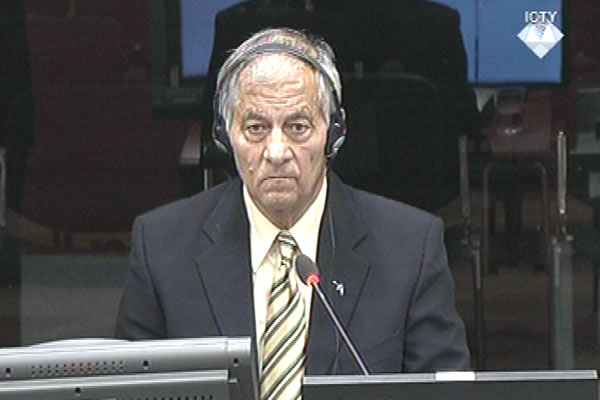Home
ARMY'S ROLE IN OMARSKA AND TOMASICA
In 2003, Ostoja Marjanovic testified in the defense of Milomir Stakic, president of the Prijedor Crisis Staff. On that occasion, he blamed the army and the police for the crimes in that municipality. Today, testifying in Ratko Mladic's defense, the former director of the Ljubija mine tried hard to exonerate the army. According to Marjanovic, the only culprit was the police and their chief in Prijedor, the late Simo Drljaca
 Ostoja Marjanovic, defence witness at Rako Mladic trial
Ostoja Marjanovic, defence witness at Rako Mladic trial Hundreds of bodies of non-Serb civilians from Prijedor and its environs were discovered in Tomasica, which was the primary mass grave and in Jakarina Kosa, the secondary mass grave. The two mass graves are both located in the Ljubija iron ore mine compound. Despite the fact that during the war he was the director of the mine, Ostoja Marjanovic claimed today that he didn't know who organized the collection and burial of the bodies in those two locations. Ostoja Marjanovic testifies in Ratko Mladic's defense.
As he was questioned by defense counsel Miodrag Stojanovic, the witness explained that the Bosnian Serb army never secured any of the mines that were part of the Ljubija compound. Thus, the Bosnian Serb army couldn't have been involved in the burial, Marjanovic noted. According to him, the mine workers guarded the mine. They wore various military uniforms, olive drab or camouflage. Marjanovic thus skirted the issue of who actually covered up the crimes in Prijedor.
In addition to the Tomasica mine in the east and the central pit in Jakarina Kosa, the Ljubija compound included the Omarska mine, where a prison camp was set up at the beginning of the war. Non-Serb civilians were abused and killed in Omarska. The witness claimed that the army didn't provide security in any part of the Ljubija mines, indirectly exonerating Mladic's troops for the events in Omarska.
Prosecutor Arthur Traldi reminded the witness in the cross-examination that in his evidence in Milomir Stakic's defense he blamed the army and police units for the events in Prijedor. Milomir Stakic was the president of the Crisis Staff in Prijedor, and Marjanovic was trying to exonerate the civilian leadership. Marjanovic said in his evidence at Stakic’s trial that in late May 1992 the 'army and police arrived in Omarska'. Asked today if he still agreed with the claim, Marjanovic replied that he was '100 percent sure' about the police. As far as the army was concerned, Marjanovic said only that it was 'possible' the army was there.He also referred to the army as the JNA, prompting the prosecutor to remind him that in that period the only army fighting on the Serb side in BH was the Republika Srpska Army.
Just as in his evidence in Stakic's defense Marjanovic shifted the blame for the crimes in Prijedor from civilian leaders to the military and police authorities, today he readily accused the police and their chief in Prijedor, the late Simo Drljaca, for the crimes, while making every effort to spare the army. The prosecutor, on the other hand, suggested that the Prijedor crimes were part of a joint criminal enterprise that involved the civilian, military and police authorities. The prosecutor borrowed the witness's words from his interview with the OTP investigators in July 2014 to describe the atmosphere during the war in Prijedor. Marjanovic then said that 'at the beginning non-Serbs paid to be allowed to remain in Prijedor, but later they gave money to be allowed to leave'.
The prosecution showed a document signed by Simo Drljaca, gifting Marjanovic with a pistol in gratitude for his 'cooperation and support' to the Prijedor police. The document was admitted into evidence. The witness explained that the Serbian minister of agriculture had given him the pistol as a gift. Drljaca only wrote a thank-you note Marjanovic used to obtain a license to carry a gun.
As the hearing drew to a close, the witness was asked several questions pertaining to the mass graves in the Ljubija mine. Soon afterwards, the trial went into private session. Tomorrow the prosecutor will have about ten minutes to question the witness further about the topic, before completing Marjanovic's cross-examination.
Linked Reports
- Case : Mladic
- 2015-11-05 EXPERT COMPLETES EVIDENCE ON SARAJEVO SNIPERS
- 2015-11-04 MLADIC’S EXPERT’S ‘TECHNICAL ERRORS’
- 2015-11-03 CONTROVERSIAL LINE OF SIGHT FOR SARAJEVO SNIPER TARGETS
- 2015-11-10 ‘THE LESS I KNOW, THE BETTER I AM’
- 2015-11-11 KRAJINA WAS MLADIC’S TESTING GROUND FOR BOSNIA
- 2015-11-12 OBSTRUCTING ‘NON-EXISTENT’ TRIBUNAL IN THE HAGUE
